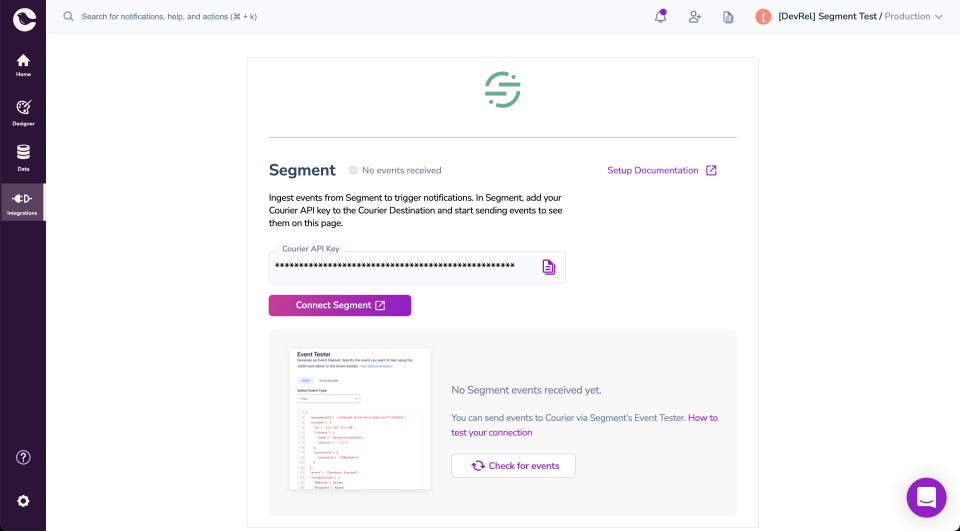Courier lands $35M to build a service for app notifications
App notifications, well intentioned or no, have become a part of daily life. A 2018 study out of Duke University estimated that -- aside from email and work app alerts -- the average person receives between 65 and 80 mobile app notifications per day. Unsurprisingly, the result is frustration. One recent survey found that half of app users consider push notifications annoying, while another suggests that 57% will take steps to avoid brands that bombard them with "poorly targeted" communications, including notifications.
Executing a successful notification strategy requires forethought. Moreover, it requires technical know-how and infrastructure. That's where Courier comes in, argues CEO Troy Goode. Courier, which today closed a $35 million Series B funding round led by GV, provides an API and "studio" to send and build notifications across multiple channels, including email, text, web and mobile.
"I founded Courier in 2019. As a former engineer and engineering executive, I experienced the pain involved with building and scaling notification infrastructure at every company I was involved with," Goode told TechCrunch in an email interview. Previously, Goode was VP of engineering at political campaign organizing platform EveryAction and a senior manager at Eloqua, a marketing automation startup. "Every time I was tasked with building a new notification system for a new product, I wished there was a service I could reach for to free up my engineering team and avoid the future headache that I knew would follow. That’s why I founded Courier."
Apps can be programmed to emit events, which Courier can receive via the platform's API or SDK. An event contains data for the notification's content (e.g., a message) and a receiver (e.g., a user). Courier generates a notification template and routes it to one or more supported channels or "providers," which include Postmark, Slack, Twilio or Sendgrid. Lastly, each provider delivers the template from Courier to the end user and Courier receives and logs delivery, open and engagement data.
Courier can proactively notify users when their action is required. And it can send dynamic, customized digests created using Courier's notification designer tool.
"[Many] user entrances to business-to-business software-as-a-service applications are driven by notifications, so getting this experience right is critical to delivering a great user experience as well as driving user engagement," Goode said. "Courier helps its customers deliver a better user experience, reduce their total cost of ownership by not needing to maintaining their own notification infrastructure and achieve a far greater amount of agility because new notifications can be shipped live in minutes."

Using Courier to send notifications with segment. Image Credits: Courier
Soon, Goode said, Courier will gain new functionality aimed at making it easier for mobile app developers to send push notifications. A new API will allow developers to deliver an ostensibly more consistent notification experience across devices, while a notification "inbox" for apps will let users access all the notifications they've received from an app in one place -- even if they've opted out of push notifications altogether.
"Mobile push notifications are often the most disruptive types of notification users receive on a daily basis. The multitude of devices, operating systems and permission protocols also means that they are the most complex to build from an engineering and product standpoint," Goode added. "These tools are essential building blocks to delivering a less disruptive, more personalized mobile notification experience."
Courier is by no stretch the first plug-and-play notification platform for apps. There's MagicBell and Notifo, the latter of which was founded way back in 2010. MagicBell is particularly competitive with Courier, offering a notification inbox that’s embeddable into existing software and provides real-time notification delivery.
But Goode asserts that Courier has managed to hold its own, attracting over 150 paying customers and raising $47.5 million to date. Goode expects the company's workforce will grow from 40 employees to 65 by the end of the year.
"Notifications are a complex and ubiquitous technical challenge and the use cases vary widely by industry. The biggest challenge is delivering a platform that can solve for customers across industries," Courier said. "Notifications are an essential part of every software product. Courier has a usage-based pricing model, so as our customers' user bases grow and they send more notifications, we are able to grow revenue. As long as overall software adoption continues to grow Courier is positioned well to grow."
Bessemer Venture Partners, Matrix Partners, Twilio Ventures, Slack Fund and Y Combinator also participated in the Series B.

 Yahoo Finance
Yahoo Finance 